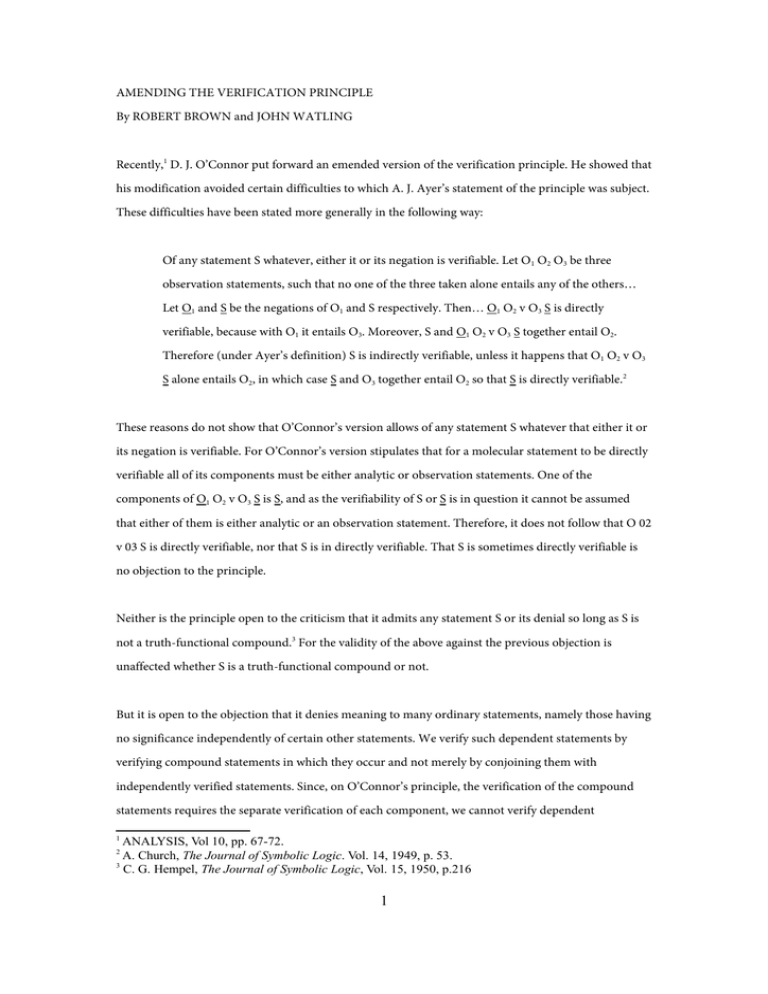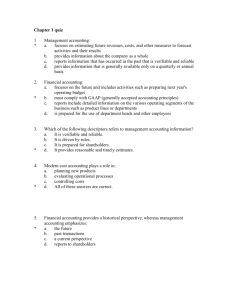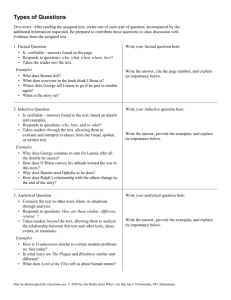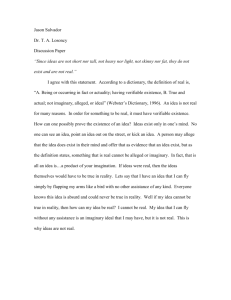AMENDING THE VERIFICATION PRINCIPLE By ROBERT BROWN and JOHN WATLING tly, D
advertisement

AMENDING THE VERIFICATION PRINCIPLE By ROBERT BROWN and JOHN WATLING Recently,1 D. J. O’Connor put forward an emended version of the verification principle. He showed that his modification avoided certain difficulties to which A. J. Ayer’s statement of the principle was subject. These difficulties have been stated more generally in the following way: Of any statement S whatever, either it or its negation is verifiable. Let O1 O2 O3 be three observation statements, such that no one of the three taken alone entails any of the others… Let O1 and S be the negations of O1 and S respectively. Then… O1 O2 v O3 S is directly verifiable, because with O1 it entails O3. Moreover, S and O1 O2 v O3 S together entail O2. Therefore (under Ayer’s definition) S is indirectly verifiable, unless it happens that O1 O2 v O3 S alone entails O2, in which case S and O3 together entail O2 so that S is directly verifiable.2 These reasons do not show that O’Connor’s version allows of any statement S whatever that either it or its negation is verifiable. For O’Connor’s version stipulates that for a molecular statement to be directly verifiable all of its components must be either analytic or observation statements. One of the components of O1 O2 v O3 S is S, and as the verifiability of S or S is in question it cannot be assumed that either of them is either analytic or an observation statement. Therefore, it does not follow that O 02 v 03 S is directly verifiable, nor that S is in directly verifiable. That S is sometimes directly verifiable is no objection to the principle. Neither is the principle open to the criticism that it admits any statement S or its denial so long as S is not a truth-functional compound.3 For the validity of the above against the previous objection is unaffected whether S is a truth-functional compound or not. But it is open to the objection that it denies meaning to many ordinary statements, namely those having no significance independently of certain other statements. We verify such dependent statements by verifying compound statements in which they occur and not merely by conjoining them with independently verified statements. Since, on O’Connor’s principle, the verification of the compound statements requires the separate verification of each component, we cannot verify dependent 1 ANALYSIS, Vol 10, pp. 67-72. A. Church, The Journal of Symbolic Logic. Vol. 14, 1949, p. 53. 3 C. G. Hempel, The Journal of Symbolic Logic, Vol. 15, 1950, p.216 2 1 statements simply by verifying their compounds. For example, the verification of “There is an electric current of one amp in this wire” might require the verification of its conjunction with “This wire has a resistance of one ohm”. Again, we might wish to verify “There is a sycamore tree in the garden” by verifying its conjunction with the law “Trees have no power of self propulsion”. This conjunction makes probable the statement “If I go into the garden tomorrow I shall see a sycamore tree”. In order to make statements of this kind significant and yet avoid the previous objections we shall have to replace the requirement that a molecular statement should contain only components which are either observation statements or analytic. We suggest the following condition: If the statement is molecular then it must not contain any component whose deletion leaves a statement which entails verifiable statements not entailed by the original statement, or does not entail verifiable statements entailed by the original statement. This condition is not open to the objection that it allows any statement whatever, or its negation, to be verifiable. O1 O2 v O3 S is not directly verifiable for any S, even though with O1 it entails O3. When S is a meaningless statement, for example “The Absolute is lazy”, O1 O2 v O3 with O1 entails O3. Hence, O1 O2 v O3 S is excluded from direct verifiability by the suggested condition. Therefore S will not be indirectly verifiable. There is one other respect in which O’Connor’s alteration is too severe. He requires that for a statement to be indirectly verifiable it should not be directly verifiable. But whereas we wish to distinguish between direct and indirect verification, this is no reason for dividing statements themselves into these two exclusive classes. Any statement must be verifiable by at least one of the two methods, and some statements may be verifiable by both. With these amendments the complete verification principle will read: A statement is directly verifiable if it is (1) either itself an observation statement or (2) satisfies the following conditions: first, that in conjunction with one or more observation statements it entails at least one observation statement which is not deducible from these other premises alone; and, secondly, that if it is a molecular statement then it must not contain any component whose deletion leaves a statement which entails verifiable statements not entailed by the original statement, or does not entail verifiable statements entailed by the original statement. 2 A statement is indirectly verifiable if it satisfies the following conditions (1), that in conjunction with certain other statements it entails one or more directly verifiable statements which are not deducible from these other premises alone; (2) that these other premises do not contain any statement which is not either analytic or directly verifiable or capable of being independently established as indirectly verifiable; and (3) that if it is a molecular statement then it must not contain any component whose deletion leaves a statement which entails verifiable statements not entailed by the original statement, or does not entail verifiable statements entailed by the original statement. 3




